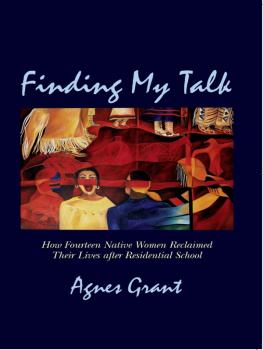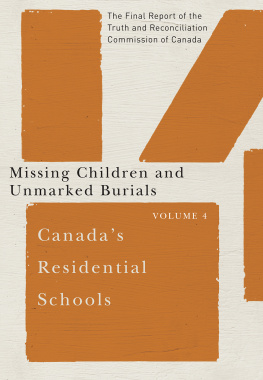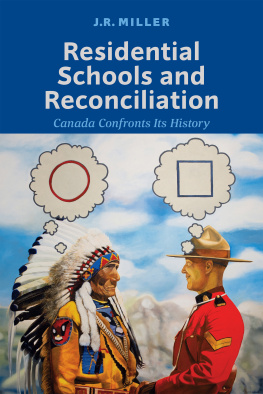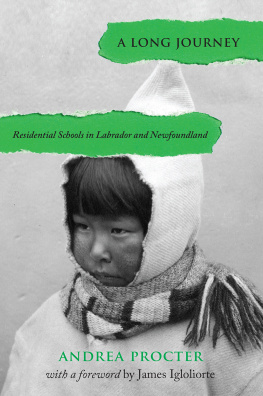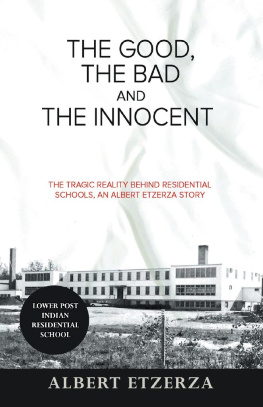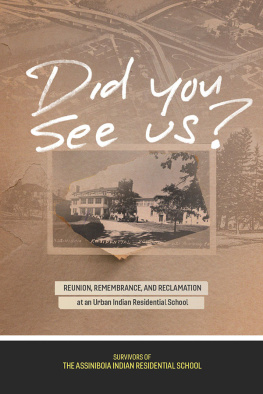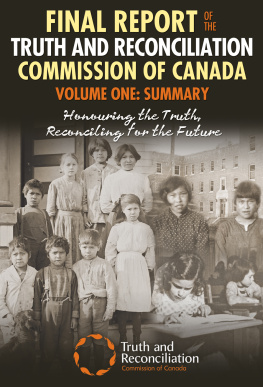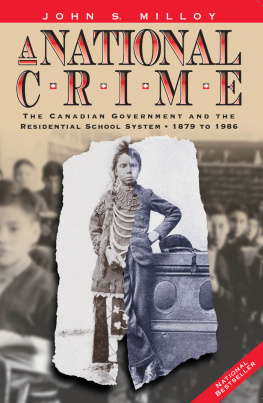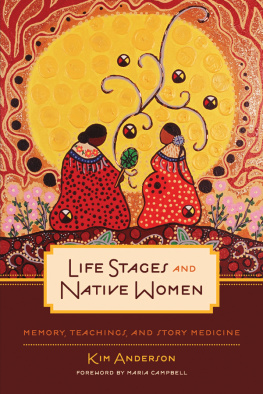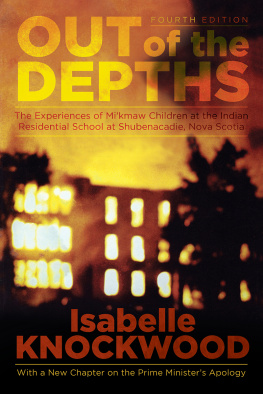Agnes Grant - Finding My Talk: How Fourteen Canadian Native Women Reclaimed their Lives after Residential School
Here you can read online Agnes Grant - Finding My Talk: How Fourteen Canadian Native Women Reclaimed their Lives after Residential School full text of the book (entire story) in english for free. Download pdf and epub, get meaning, cover and reviews about this ebook. year: 2011, publisher: Fifth House Books, genre: Politics. Description of the work, (preface) as well as reviews are available. Best literature library LitArk.com created for fans of good reading and offers a wide selection of genres:
Romance novel
Science fiction
Adventure
Detective
Science
History
Home and family
Prose
Art
Politics
Computer
Non-fiction
Religion
Business
Children
Humor
Choose a favorite category and find really read worthwhile books. Enjoy immersion in the world of imagination, feel the emotions of the characters or learn something new for yourself, make an fascinating discovery.
- Book:Finding My Talk: How Fourteen Canadian Native Women Reclaimed their Lives after Residential School
- Author:
- Publisher:Fifth House Books
- Genre:
- Year:2011
- Rating:5 / 5
- Favourites:Add to favourites
- Your mark:
- 100
- 1
- 2
- 3
- 4
- 5
Finding My Talk: How Fourteen Canadian Native Women Reclaimed their Lives after Residential School: summary, description and annotation
We offer to read an annotation, description, summary or preface (depends on what the author of the book "Finding My Talk: How Fourteen Canadian Native Women Reclaimed their Lives after Residential School" wrote himself). If you haven't found the necessary information about the book — write in the comments, we will try to find it.
Agnes Grant: author's other books
Who wrote Finding My Talk: How Fourteen Canadian Native Women Reclaimed their Lives after Residential School? Find out the surname, the name of the author of the book and a list of all author's works by series.
Finding My Talk: How Fourteen Canadian Native Women Reclaimed their Lives after Residential School — read online for free the complete book (whole text) full work
Below is the text of the book, divided by pages. System saving the place of the last page read, allows you to conveniently read the book "Finding My Talk: How Fourteen Canadian Native Women Reclaimed their Lives after Residential School" online for free, without having to search again every time where you left off. Put a bookmark, and you can go to the page where you finished reading at any time.
Font size:
Interval:
Bookmark:
About the Author
Dr. Agnes Grant worked with the Native Teacher Training programs at Brandon University, Manitoba, for thirty years. She travelled extensively in remote and isolated communities, both as an administrator and as a professor. As she listened to the students and community members, she learned of the tremendous effect residential schools have had on members of First Nations and Canadian society in general. Her painstaking research and interview methods ensure that it is the womens voices we hear in FindingMy Talk. These women are not merely presented as history but as contemporary members of todays global society.
Dr. Grant is the author of No End of Grief: Indian Residential Schoolsin Canada and three other books. She lives in Winnipeg.
Finding My Talk
How Fourteen Native Women Reclaimed Their Lives after Residential School
Agnes Grant

Copyright 2004 Agnes Grant
EPub edition copyright June 2011 Agnes Grant
All rights reserved. No part of this publication may be reproduced, stored in a retrieval system or transmitted, in any form or by any means (electronic, mechanical, photocopying, recording or otherwise), without the prior written permission of Fifth House Ltd. or, in case of photocopying or other reprographic copying, a licence from Access Copyright (Canadian Copyright Licensing Agency), 1 Yonge Street, Suite 1900, Toronto, ON M5E 1E5, fax (416) 868-1621.
By purchasing this e-book you have been granted the non-exclusive, non-transferable right to access and read the text of this e-book on screen. No part of this text may be reproduced, transmitted, downloaded, decompiled, reverse engineered, or stored in or introduced into any unauthorized information storage and retrieval system, in any form or by any means, whether electronic or mechanical, now known or hereinafter invented, without the express written permission of Fifth House Ltd.
Cover and interior design by Kathy Aldous-Schleindl
Front cover artwork: Pow Wow Dream by Joane Cardinal-Schubert
Edited/copyedited by Meaghan Craven
Proofread by Lesley Reynolds
Fifth House Ltd. acknowledges with thanks The Canada Council for the Arts, and the Ontario Arts Council for their support of our publishing program. We acknowledge the financial support of the Government of Canada through the Canada Book Fund (CBF) for our publishing activities

10 9 8 7 6 5 4 3 2 1
Library and Archives Canada Cataloguing in Publication
Grant, Agnes, 1933 Finding my talk : how fourteen Native women reclaimed their lives after residential school/Agnes Grant
ISBN: 1-894856-57-0
eISBN: 978-1-927083-99-4
1. Native women--Canada--Biography. 2. Native women--Education--Canada History. 3. Native peoples-Canada--Residential schools. 4. Native children--Abuse of--Canada. I. Title.
E96.5.G718 2004 371.82997071 C2004-904870-8
First published in the United States in 2005 by
Fitzhenry & Whiteside
311 Washington Street,
Brighton, MA 02135
Published by
Fifth House Ltd.
A Fitzhenry & Whiteside Company
195 Allstate Parkway
Markham, ON L3R 4T8
18003879776
www.fifthhousepublishers.ca
To all the children
of residential school survivors,
may your lives be filled with
understanding,
forgiveness,
healing,
peace, and love.
Contents
, Cree, Saskatchewan
, Cree/Saulteaux, Saskatchewan
, Mikmaq, Nova Scotia
, Inuit, Northwest Territories
, Mikmaq, Nova Scotia
, Nlakapmux, British Columbia
, Mikmaq, Nova Scotia
, Dakota, Manitoba
, Mixed Blood, Alberta
, Nuu-chah-nulth, British Columbia
, Mtis, Alberta
, Cree, Manitoba
, Ojibway, Ontario
We survive,
and we do more than survive.
We bond, we care, we fight, we teach,
we nurse, we bear, we feed, we earn, we laugh,
we love, we hang in there, no matter what.
The words of Paula Gunn Allen, a Laguna Pueblo/Lakota poet, writer, scholar, and professor of English succinctly describe the essence of the women who are featured in this book. The resistance and resilience displayed by these women is awe-inspiring, as are their achievements and phenomenal successes in their chosen careers. There are many women who did not survive the residential schools, women who still lead lives of quiet despair, and many have suffered premature deaths. They are a continuing shadow on our souls, but we must remind ourselves there also are those who have survived, the ones who are examples and an inspiration to us all. The stories in this book attest to the fact that there is life after residential school, and that life can be good.
I am an Ojibway from Sandy Bay First Nation in Manitoba. My formal schooling began in Sandy Bay Residential School in 1963. I did my time for seven years, and there were four significant lessons I learned in that institution. I learned how to be silent and how to be obedient to authority. I learned that being Indian is to be inferior. I also learned how to read and write.
During those years I witnessed many incidents of humiliating punishments for minor sins. In her biography Shirley Sterling points out that we were punished, not for being bad, but for being children. Running away and insubordination were mortal sins punished in secret. Otherwise, every punishment was formally displayed in front of all students. Public humiliation was always a part of the punishment.
My memories of life in residential school are sporadic, as are my memories of my life as a child in general. I remember two incidents of severe child abuse; one in which I experienced physical abuse, the other in which a classmate was the victim. She was an adolescent girl who was humiliated in the worst possible fashion. Sister Theresa, a formidable woman, forced her to stand in full view of the rest of us girls for hours with her blood-stained panties over her head. While she stood there, we treated her as if she were invisible. We saw it as a way of maintaining the dignity of the victim, whereas in truth we were validating the unjust treatment by simply accepting it. We were well trained to ignore it and remain silent. I would dearly love to have memories of abuse blotted from my mind, but they remain there, firmly etched. Today I view these memories as validation of claims that abuse occurred in this particular school. I saw it and I felt it.
I shelved the manuscript for this book for many days before I summoned the courage to start reading it. I had to prepare myself; actually, I felt I had to armour myself so that I would not succumb to depression while I read these biographies involving residential school experiences. I was afraid my old scars, which I have struggled so long and hard to overcome, would be excoriated by these testimonies.
I did experience myriad reactions, but none that evoked any personal emotional turmoil. I did feel compassion and empathy, but neither anger nor anguish. Perhaps that is a testimonial to the progress of my personal journey of healing, but, more accurately, I believe my response shows that this book is not just another book about abuse in residential schools. It is a triumph over the emotional, physical, mental, and spiritual abuses experienced by so many, a book that demonstrates success in spite of adversity. This is what makes this book unique. It offers hope to those who endured abuse in residential schools because evidence of healing is found in the lives of these remarkable women.
Next pageFont size:
Interval:
Bookmark:
Similar books «Finding My Talk: How Fourteen Canadian Native Women Reclaimed their Lives after Residential School»
Look at similar books to Finding My Talk: How Fourteen Canadian Native Women Reclaimed their Lives after Residential School. We have selected literature similar in name and meaning in the hope of providing readers with more options to find new, interesting, not yet read works.
Discussion, reviews of the book Finding My Talk: How Fourteen Canadian Native Women Reclaimed their Lives after Residential School and just readers' own opinions. Leave your comments, write what you think about the work, its meaning or the main characters. Specify what exactly you liked and what you didn't like, and why you think so.

